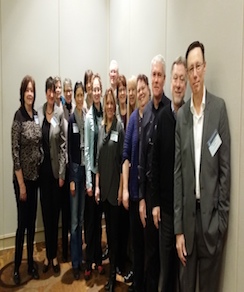The word complexity sums up an evaluation of a TAACCCT grant. Evaluators who attended this year’s Transformative Change Initiative’s (TCI) Learning Lab explored this idea of complexity and were encouraged to share and learn from one another about meaningful ways to gather, analyze, and report data.
Evaluators gather over breakfast for an informal discussion about their work with TAACCCT projects.
Over the last three days, the TCI Evaluation Collaborative hosted a series of sessions, including a half day pre-session where evaluators participated in interactive discussions about their TAACCCT evaluations. Topics of importance to the group included implementation evaluation, logic modeling, outcomes and impact evaluation, unemployment wage analysis, cost benefit analysis, and scaling/sustainability assessment. Plenary sessions focused on using evaluation to scale transformative change, evaluating complexity, and encouraging data utilization through data placemats.
I am hopeful that every evaluator in attendance found their experience at this year’s conference to be rewarding and enriching. For me, the real success of the event was the collaboration that was fostered among the evaluators in attendance. Throughout the event the evaluators freely shared their experiences and expertise with one another and with other TAACCCT leaders. These interactions helped to build a community of practice where evaluators are both validated and supported, allowing them to expand their capabilities and improve their practice. This is especially true for new evaluators, such as myself. I am grateful for this experience and for the opportunity to be part of this community of evaluators. The conference’s keynote speaker, Michael Horn from Clayton Christensen Institute, summed it up nicely by saying, “Innovation in isolation is hard, supports are necessary.” For evaluators of TAACCCT grants, I would observe, “Evaluation in isolation is hard, a learning community is necessary.”
Heather L. Fox is a project coordinator for OCCRL. She is passionate about supporting P-14 districts efforts to provide students with equitable and high quality career pathways.
